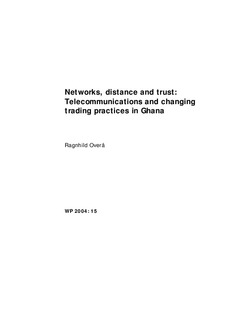| dc.contributor.author | Overå, Ragnhild | |
| dc.date.accessioned | 2008-02-22T07:31:09Z | |
| dc.date.accessioned | 2017-03-29T09:13:01Z | |
| dc.date.available | 2008-02-22T07:31:09Z | |
| dc.date.available | 2017-03-29T09:13:01Z | |
| dc.date.issued | 2004 | |
| dc.identifier.isbn | 82-8062-100-8 | |
| dc.identifier.issn | 0804-3639 | |
| dc.identifier.uri | http://hdl.handle.net/11250/2436002 | |
| dc.description.abstract | Ghana liberalized its telecom sector in 1995. This study looks
at the impact of the phenomenal growth in access to telephones
on the business practices of traders in cloth, fish and
agricultural produce. The article examines how the use of
telecommunication technology reduces traders’ time and
transportation costs, and explores its impact on initiation and
maintenance of relationships of trust in trade networks. It is
argued that with a tool for more efficient communication over
long distances, transportation and transaction costs are reduced.
The quality of the services that traders provide and the profit
they make thus improves. | |
| dc.language.iso | eng | |
| dc.publisher | Chr. Michelsen Institute | |
| dc.relation.ispartofseries | CMI Working paper | |
| dc.relation.ispartofseries | WP 2004: 15 | |
| dc.subject | Telecommunications | |
| dc.subject | Traders | |
| dc.subject | Trust | |
| dc.subject | Africa | |
| dc.subject | Ghana | |
| dc.title | Networks, distance and trust: Telecommunications and changing trading practices in Ghana | |
| dc.type | Working paper | |
